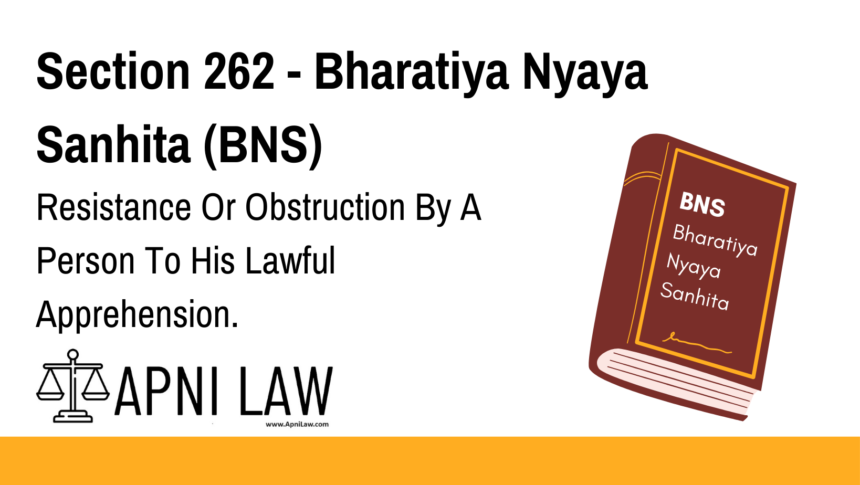Code: Section 262 BNS
“Whoever intentionally offers any resistance or illegal obstruction to the lawful
apprehension of himself for any offence with which he is charged or of which he has been
convicted, or escapes or attempts to escape from any custody in which he is lawfully
detained for any such offence, shall be punished with imprisonment of either description
for a term which may extend to two years, or with fine, or with both.
Explanation.—The punishment in this section is in addition to the punishment for
which the person to be apprehended or detained in custody was liable for the offence with
which he was charged, or of which he was convicted.
Explanation of Section 262 BNS
Section 262 of the Bharatiya Nyaya Sanhita (BNS) deals with the criminal offense of resistance or obstruction during lawful apprehension or custody. This section is designed to uphold the authority of law enforcement agencies and ensure that individuals do not obstruct or evade justice when they are lawfully apprehended or detained.
This provision applies to anyone who intentionally resists being arrested or attempts to escape from lawful custody, such as when:
- A person fights back against police officers during an arrest.
- A person breaks free from a detention facility or police van.
- A person uses force to hinder law enforcement officers from taking them into custody.
Key Elements of the Offense
- Intentional Resistance or Obstruction:
- The person must intentionally resist or obstruct the lawful apprehension or detention.
- Lawful Apprehension or Custody:
- The apprehension or detention must be legal and based on an offense the person is charged with or convicted of.
- Punishment:
- Imprisonment (up to 2 years), or
- Fine, or
- Both.
- Additional Punishment:
- The punishment under Section 262 is in addition to any punishment for the original offense.
Illustrations
Example 1: Resisting Police During Arrest
A person is wanted for theft. When the police arrive to arrest them, the person physically assaults the officers to escape. This act of resistance can lead to prosecution under Section 262, in addition to the theft charge.
Example 2: Attempting to Escape from Police Custody
A prisoner convicted of fraud tries to escape from the police station by breaking the lock of his cell. This attempt to flee is punishable under Section 262, in addition to the sentence for fraud.
Example 3: Obstructing Arrest by Providing False Information
A person knowingly provides false information to the police to mislead them about the location of a fugitive they are trying to apprehend. This act of obstruction could be covered under Section 262.
Common Questions and Answers on Section 262 BNS
1. What does “resistance” mean under Section 262?
- Answer: Resistance includes any act where a person actively opposes or hinders the lawful arrest or detention, such as fighting back, using force, running away, or providing false information.
2. Is it necessary to cause harm to the officer for the offense to apply?
- Answer: No, the offense applies even if no physical harm is caused. Verbal threats, physical struggle, or attempts to flee are sufficient for prosecution.
3. Does Section 262 apply if the arrest was unlawful?
- Answer: No, Section 262 only applies when the apprehension or detention is lawful. If the arrest is illegal, the person may have grounds to resist without facing punishment under this section.
4. Can a person be punished under Section 262 if they are already in custody?
- Answer: Yes, if a person attempts to escape from lawful custody, even if they are already detained, they can be punished under Section 262.
5. What is the maximum punishment under Section 262?
- Answer: The maximum punishment is imprisonment for 2 years, a fine, or both.
Conclusion
Section 262 of the Bharatiya Nyaya Sanhita (BNS) reinforces the authority of law enforcement and ensures that individuals cannot obstruct or resist lawful apprehension or custody. The provision aims to promote discipline, respect for the rule of law, and accountability, ensuring that justice is served effectively without hindrance.







